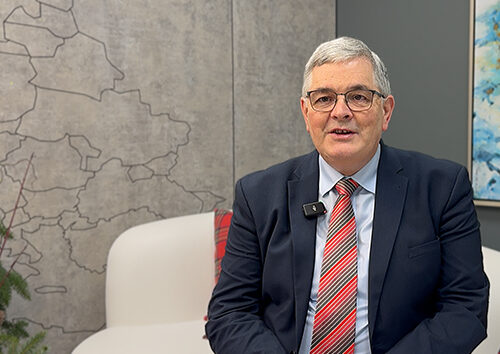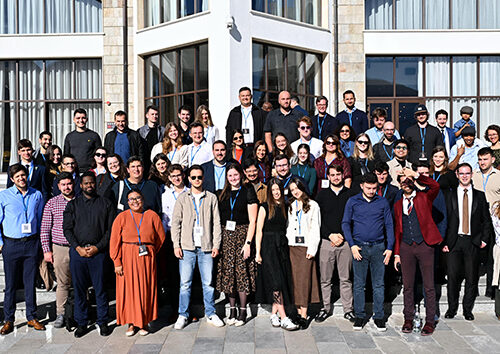30 August 2018 | Belgrade, Serbia [Julian Hibbert]
Why would you travel almost 1,692 km (and in some instances much further) at considerable expense, in order to attend a four-day pastors’ convention in Belgrade, Serbia? In my case, I found the answer on day one of the 2018 European Pastors’ Council (EPC) in the form of five intensely interesting and well delivered plenary presentations.
Morning Worship
First up was that by Dr Daniel Duda, Education Director and Field Secretary of the Trans-European Division (TED). It took the form of a sermon about ‘the most dramatic conversion story in the Bible’ and was aptly titled, ‘I’ll be there for you.’ Basing his remarks on Acts 9:10-15, Dr Duda deftly explained who Saul was and why this devout Pharisee was the Church’s fiercest enemy of his day, seeing this new faith as ‘a dangerous threat to first-century Judaism.’
He went on to describe Saul as someone whose core beliefs differed little from those of the early followers of Jesus or from most of ours today (Sabbath, mortality of the soul, tithing, ‘clean and unclean’ food distinctions, etc), except in one major point, that of accepting Jesus as Messiah and Saviour. To Dr Daniel, Saul was a ‘disconnected soul’, ready to take the lives of those who differed with him. God had other intentions, however, and took the bold step of confronting Saul on the road to Damascus, leaving this proud individualist totally dependent upon others.
He is suddenly made aware ‘that religion is primarily about connection’ – the EPC’s chosen theme for the day – and that the person chosen by God to help him understand that vital lesson is Ananias, who appears briefly in the Bible narrative at God’s instruction: ‘Ananias, arise and go to the street called Straight. There you will meet a man named Saul. Go, welcome him into the faith, because I have got plans for him. I have chosen him to be my missionary to all the Gentiles.’ (Acts 9:11, NLT)
According to Dr Daniel, Ananias’ initial reluctance to visit Saul is understandable: ‘Most probably he had friends, even close family members, who had been in prison or put to death through the efforts of this Saul. He didn’t wish to do him any harm, but why should he wish him any good?’ Despite this he follows God’s instruction to connect with this enemy of the Church, welcome him into the faith as ‘Brother Saul’, lay hands on him so he can regain his sight, and thus become ‘the agent of one of the most dramatic transformations in all of Scripture?’
Dr Daniel actually sees Acts 9:10-15 as a tale of two connections, that of Saul connecting to Christ, but also of Ananias connecting with Saul to facilitate his conversion. ‘We never hear about Ananias again. He evidently went back home and about his business, having played his part in this great drama of Christian conversion of which his willing assistance was an indispensable part. If God is going to reach Europe in the 21st century it is going to be through people like Ananias . . . like you pastors, Bible workers, people who are willing to connect to others and become tools of God’s transforming grace in their lives.’
Saul had to learn that, ‘Being God’s people is as much about the right relationships – being a community of connected people – as it is about the right doctrines.’ Today we have ![Dr Daniel Duda [photo credit: ADAMS/Lungani Sibanda] EPC18 Duda](https://ted.adventist.org/sitenews/wp-content/uploads/2018/08/images_news-2018_EPC18-Duda-scaled.jpg) something to learn too: ‘If I realize that God has already accepted me, I can actually accept you. And listen to this: I have not contributed to that acceptance. It happened on the cross of Calvary, 2000 years ago. So, I don’t need to demand that you must first contribute to your acceptance, before I can accept you . . . I have been accepted and I have been given the longing to accept; . . . I can pour into your life what has been poured into mine!’
something to learn too: ‘If I realize that God has already accepted me, I can actually accept you. And listen to this: I have not contributed to that acceptance. It happened on the cross of Calvary, 2000 years ago. So, I don’t need to demand that you must first contribute to your acceptance, before I can accept you . . . I have been accepted and I have been given the longing to accept; . . . I can pour into your life what has been poured into mine!’
Dr Daniel’s presentation was brimming with a warm and gracious biblical theology. A message of hope, from which we can snatch this as a closing thought. Speaking of Ananias he said: ‘He was just an ordinary Christian in Damascus. But he was capable of making an extraordinary connection! So, what does this teach us? . . . Discipleship means taking ordinary, everyday people and turning them into courageous people who are able to relate to others in the same way that Jesus relates to us.’
Three Connect Talks
True to the council’s theme for the day, the Connect Talks were designed to provide stimulating input on how to connect with others, both inside and beyond the Church. Each presentation was followed up by a very brief discussion.
Faith in a faithless world: how to share Christ with unbelievers
![Dr Kleber Gonçalves [photo credit: ADAMS/Elsie Tjeransen] EPC18 Goncalves](https://ted.adventist.org/sitenews/wp-content/uploads/2018/08/images_news-2018_EPC18-Goncalves-scaled.jpg) This was presented by Dr Kleber D. Gonçalves, Director of the Global Mission Centre for Secular and Postmodern Studies, who is also involved in the running of a major church plant in the city of São Paulo, Brazil.
This was presented by Dr Kleber D. Gonçalves, Director of the Global Mission Centre for Secular and Postmodern Studies, who is also involved in the running of a major church plant in the city of São Paulo, Brazil.
Dr Kleber set the scene for his brief presentation by relating an experience he had while on an 11-hour flight from Chicago to São Paulo, during which he found himself next to a very interesting travelling companion. Soon after they took off, the customary question was posed to Dr Kleber: ‘Well, what do you do for a living?’ To which he smilingly responded: ‘I am a pastor.’ In response to which his seat mate said: ‘Well, I am an agnostic!’
That began a long discussion about faith, religion, unbelief and everything related, with the two men doing everything they could to convince each other of the rightness of their respective positions. Dr Kleber prayed silently for God’s help in dealing with the sensitive discussion while the other person took regular sips of whiskey from a bottle he had bought in the duty-free shop!
That discussion and many subsequent encounters with those who have radically different world views to his own have helped him to develop the following important points to consider:
-
Keep a humble and prayerful attitude when speaking the truth in love. It is not our role to change the world view or attitude of other. This is the Holy Spirit’s work, but we should always be ready to give the reasons for our faith. (Ephesians 4:15)
-
Pay attention to the reasons for their non-belief. These could be bad experiences involving family, friends, church members and God. They could also involve sick and dying loved ones, and a misunderstanding of God’s attitude towards suffering.
-
Use the intellectual resources of Christian apologetics with wisdom and tact. Regarding faith: some are curious, others indifferent and some openly hostile, but all must be treated as sincere and shown respect. Whenever we present any of the arguments of Christian apologetics we must do so with gentleness and in a Christlike manner. Avoid the temptation of doggedly trying to prove the existence of God beyond all reasonable doubt.
-
Invite them to your home first if possible. Only after we have gained their trust should we consider inviting them to church, if this is appropriate – but never parade them as trophies that have been won.
-
Paul did his best to reduce the distance between the non-believer and himself in an intentional way. We need to do likewise, showing grace, love and hope to them at all times.
Leadership lessons: Connect the dots from church to community
![Pastor Guiséle Berkel-Larmonie [photo credit: ADAMS/Lungani Sibanda] EPC18 Berkel Larmonie](https://ted.adventist.org/sitenews/wp-content/uploads/2018/08/images_news-2018_EPC18-Berkel-Larmonie-scaled.jpg) This presentation was by Pastor Guiséle Berkel-Larmonie, who has had rich experience pastoring a large church in The Hague (Netherlands). When she arrived, the congregation comprised around 300 members of whom 100 attended regularly and only 40 were active. In addition to this the membership was multi-ethnic, multi-lingual (12 languages) and multi-generational.
This presentation was by Pastor Guiséle Berkel-Larmonie, who has had rich experience pastoring a large church in The Hague (Netherlands). When she arrived, the congregation comprised around 300 members of whom 100 attended regularly and only 40 were active. In addition to this the membership was multi-ethnic, multi-lingual (12 languages) and multi-generational.
There hadn’t been a baptism for three years although there were 21 unbaptised people attending regularly, including a mother of two who had been visiting there for 14 years. Her name was Angelina, and Pastor Guiséle was the first minister to have ever asked her what her name was! As she put it, Angelina had just fallen through the ‘Happy Sabbath!’ crack week after week for all those years.
It was a well-resourced church, but a disconnected congregation. It was a church but not a community and she set about trying to create a sense of community based on this thought by Mary Pipher: ‘Language imparts identity, meaning and perspective to our human conditions.’ And these were the three linguistic instruments that she used:
-
Catchy, positive slogans.
-
Pastoral encounters. Knowing that there was no way she could visit all the members each week, she started asking people how they felt as they left the sanctuary each week, taking time to listen to them. At first it was embarrassing for people to wait while she spoke to those ahead of them. But then they began to speak to each other while they waited. Then they began staying on to enjoy something to drink and some fellowship.
-
Incarnational preaching. She began to preach sermons that everyone could relate to, even while speaking on matters of doctrine. According to Pastor Guiséle, we need to speak life – to use a language that connects us with our audience.
Once she had this working she began with activities that connect:
-
Breaking bread together. She made every effort to get young adults to participate in church life according to their gifts – to become part of the congregational fabric. By sharing their gifts they opened themselves up to receiving recognition and appreciation from the other members.
-
‘Waterproof’ Bible study group. This involved having a free meal at the church once a week to which everyone was invited. At this meal they were able to ask whatever questions they had on their minds.
-
Doing things together. Here she encouraged members to organise things for each other like chatting, walking and cycling activities – even such things as camps and retreats.
She admits to making some mistakes and not all were willing to accept change. ‘Some were “consumer oriented” and we lost them – but overall there was growth.’ However, ‘We need to continually innovate and never give up!’
And, praise be to God, Angelina and one of her sons were subsequently baptised and became active members too.
Connecting youth to the church
![Pastor Anthony Fuller [photo credit: ADAMS/Lungani Sibanda] EPC18 Fuller](https://ted.adventist.org/sitenews/wp-content/uploads/2018/08/images_news-2018_EPC18-Fuller-scaled.jpg) This was presented by Pastor Anthony Fuller, South England Conference (SEC) Youth Director, who expressed his concern that we are losing ‘our youth at an alarming rate – especially the millennials.’ Among their concerns is that church worship is boring and that it does not meet their needs. Pastor Anthony however, adopted the position that the church cannot be these things because by its very nature – if practiced properly – it is alive and dynamic.
This was presented by Pastor Anthony Fuller, South England Conference (SEC) Youth Director, who expressed his concern that we are losing ‘our youth at an alarming rate – especially the millennials.’ Among their concerns is that church worship is boring and that it does not meet their needs. Pastor Anthony however, adopted the position that the church cannot be these things because by its very nature – if practiced properly – it is alive and dynamic.
He vividly illustrated how, in many of the churches he visits, worship is largely a repetition of standing and sitting for songs, hymns and prayers – suggesting that it should consist of more than this. A deepening, ongoing and respectful conversation between all the worship stakeholders is essential if we are to suitably enrich our church services for all.
According to Pastor Anthony, church life and worship was never meant to consist of a single event – with all our activities packed into the Sabbath. Instead, he makes the point that church is a lifestyle experience. This should motivate us to establish various small group activities between weekends, because one cannot build authentic relationships in a connected congregation without them. The result of these extramural activities will result in an intimate church community where connectedness is a lifestyle.
tedNEWS Staff: Victor Hulbert, editor; Sajitha Forde-Ralph, associate editor
119 St Peter’s Street, St Albans, Herts, AL1 3EY, England
E-mail: [email protected]
Website: www.ted.adventist.org
tedNEWS is an information bulletin issued by the communication department of the Seventh-day Adventist Church in the Trans-European Division. Readers are free to republish or share this article with appropriate credit including an active hyperlink to the original article.



